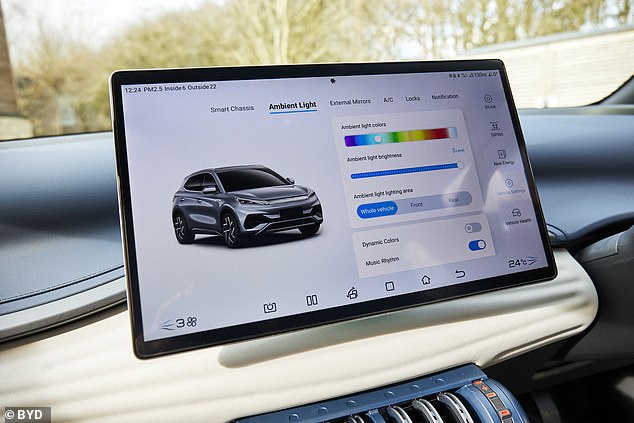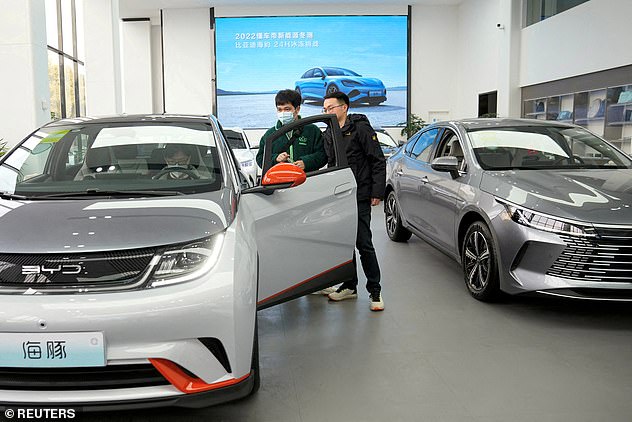Aussie makes astonishing claim about his BYD electric car amid fears the vehicles could spy on YOU
An Australian man has made a surprising claim that his Chinese-made electric car can spy on him using its SIM card.
The man, who drives a BYD EV, shared a video on social media in which he claimed the car’s software was able to listen in on his conversations via the SIM card.
SIM cards are now standard in most new cars and provide continuous, always-on access to the Internet and various online services.
But the man warned that his BYD’s SIM card could be dialed by a third party, allowing calls to be sent from the vehicle without the driver knowing.
In the video, the man called the car’s SIM card and audio from the car could be heard on his phone, but there was no indication on the EV’s digital display that a call was taking place.
It seemed there was no way to end the call from the car and calling the car’s SIM card was still possible even with the engine turned off.
The latest claim followed former Deputy Prime Minister Barnaby Joyce’s warning that Australia should follow the US and consider banning Chinese-made electric cars over security and privacy fears.
More than 80 percent of electric vehicles sold in Australia are manufactured in China, including popular Chinese brands BYD, MG and Geely.
Speaking on Sunday, Mr Joyce questioned whether they could be weaponized for a “malicious purpose”.
An Australian driving a BYD EV posted a video on social media claiming the software could listen to what he was saying. Stock image

In the video, the man called the car’s SIM card and audio from the car could be heard on his phone, but there was no indication on the EV’s digital display that a call was taking place. Stock image
Both Labor and the Coalition have ruled out a ban, which the US is considering amid fears the technology in these cars would pose risks to national security and privacy.
But Mr Joyce said Australia must be careful after Israel secretly built explosives into hundreds of pagers carried by Hezbollah members before detonating the wireless devices, killing 12 people and injuring thousands.
“After the pager issue … the penny dropped for so many people that there is a remote capacity to cause enormous pain, enormous pain, perhaps at the very least to create complete collapse and chaos,” he told Sky News.
“People need to start asking questions, like can you update the software, can you track these vehicles, are they made in China, is there a malicious purpose behind them from a totalitarian state, what could be the consequences of that?”
Last week, U.S. Commerce Secretary Gina Raimondo said the U.S. would move to ban electric vehicles amid fears that the technology in these cars, including internet-enabled cameras, microphones and GPS tracking, would pose risks to national security and privacy.
“It doesn’t take much imagination to understand how a foreign adversary with access to this information could pose a serious risk to both our national security and the privacy of citizens,” she said.
“In an extreme situation, foreign adversaries could disable or take control of all their vehicles in the United States at the same time.”
Despite US concerns, Energy Minister Chris Bowen said he wanted Australians to have the “maximum range of choice” of cars.
“We will not ban vehicles made in a particular country. We will continue to work with all relevant agencies to ensure all necessary arrangements are in place, but I want Australians to have more choice of vehicles to buy, not less, more choice,” he said.
In a previous complaint about issues with Chinese car SIM cards, a driver said he “couldn’t end the secret conversation from the car, even by opening the phone app or pressing the answer/hang up button on the steering wheel.” .
“Even if I turned off my cell phone I could receive calls, so there is no way I can see that an Australian Atto 3 customer could have privacy in his own car if someone is spying on him,” they said. autoexpert.com.au in January 2023.
Another driver said they had received several calls using their car’s SIM card, suggesting it may have been used in a phone before.
“I somehow had four different people call my car… The first time I thought someone had connected to my Bluetooth, but after the fourth I assumed they somehow called my SIM number,” they said.

BYD electric vehicles (EV) are on display at a car dealership in Shanghai, China, February 3, 2023

Barnaby Joyce (pictured) said Chinese-made electric vehicles could be weaponized for a ‘malicious purpose’
BYD’s Australian distributor, EVDirect, said at the time it was working with Telstra, the SIM provider, to resolve the issue.
“There is no risk of exposure for people obtaining car owner data,” says Luke Todd of EVDirect.
‘All data and SIM information is held securely by Telstra.’
In a previous complaint about issues with Chinese car SIM cards, a driver said he “couldn’t end the secret conversation from the car, even by opening the phone app or pressing the answer/hang up button on the steering wheel.” .
Daily Mail Australia has contacted BYD for further comment.
